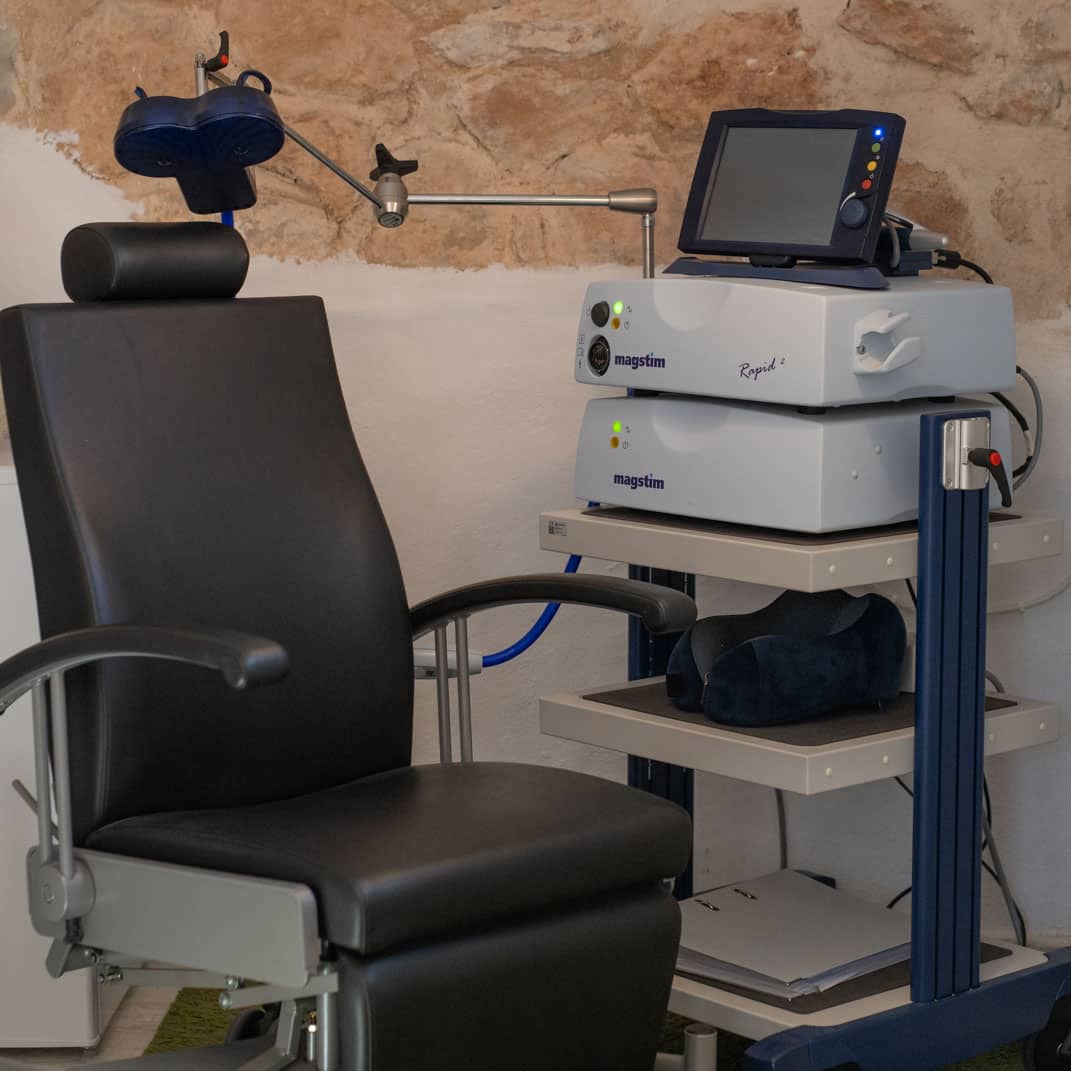The power of TMS and iTBS in treating depression and addiction
Contents
What is TMS?
Transcranial magnetic stimulation (TMS) is a non-invasive, drug-free brain stimulation therapy that uses magnetic fields to activate specific areas of the brain. Primarily used to treat depression, TMS has also shown promise in addressing various mental health and addiction-related conditions. The procedure involves placing a magnetic coil near the scalp, which emits pulses that stimulate nerve cells involved in mood regulation. Unlike treatments such as electroconvulsive therapy (ECT), TMS does not require anaesthesia and is generally well-tolerated, with minimal side effects.
What does TMS do?
TMS targets the dorsolateral prefrontal cortex, a brain region often underactive in individuals with depression and addiction. By stimulating this area, TMS enhances neural connectivity and neurotransmitter activity, leading to improved mood and cognitive function. The therapy is typically administered over several sessions, with each lasting about 20 to 50 minutes. Patients can resume normal activities immediately after treatment, making it a convenient option for many.
What is TMS good for?
Initially developed for treatment-resistant depression, TMS has expanded its therapeutic reach to include:
- Major depressive disorder (MDD): TMS has been effective for patients who have not responded to traditional antidepressant medications.
- Substance use disorders: Emerging research indicates that TMS can reduce cravings and consumption in individuals addicted to substances like cocaine, alcohol, and nicotine.
- Obsessive-compulsive disorder (OCD): TMS has received FDA approval for treating OCD by targeting specific brain circuits involved in the disorder.
- Post-traumatic stress disorder (PTSD): Preliminary studies suggest TMS may alleviate PTSD symptoms by modulating neural pathways associated with fear and stress responses.
- Anxiety disorders: TMS is being explored as a treatment for various anxiety disorders, with some studies showing promising results.
New research showing efficacy of theta-bursts.
Intermittent Theta-Burst Stimulation (iTBS) is a newer, more efficient form of TMS that delivers bursts of stimulation at specific frequencies. Recent studies have demonstrated that iTBS is as effective as traditional high-frequency TMS in treating depression, but with significantly shorter session times—approximately 3 minutes compared to the standard 37 minutes.
Moreover, iTBS has shown rapid antidepressant effects, with some patients experiencing symptom relief after just a few sessions. This accelerated response is particularly beneficial for individuals seeking prompt relief from severe depressive symptoms.
How it differs.
The primary distinction between iTBS and traditional TMS lies in the delivery pattern and duration of the magnetic pulses. While conventional TMS administers continuous high-frequency stimulation, iTBS delivers bursts of high-frequency pulses interspersed with short pauses, mimicking the brain’s natural theta rhythms. This pattern not only reduces treatment time but may also enhance the therapy’s efficacy by promoting more naturalistic neural activity.
The benefits of TMS and psychotherapy combined.
Combining TMS with psychotherapy has been shown to produce superior outcomes compared to either treatment alone. A study found that patients receiving both TMS and psychotherapy exhibited a 66% response rate and a 56% remission rate, with sustained benefits observed at a six-month follow-up.
This integrative approach leverages the neurobiological enhancements from TMS to facilitate deeper engagement in psychotherapy, allowing patients to process emotions and develop coping strategies more effectively. The synergy between these treatments offers a comprehensive path to recovery, addressing both the biological and psychological facets of mental health disorders.
TMS at Ibiza Calm.
At Ibiza Calm, we are committed to providing cutting-edge, evidence-based treatments for mental health and addiction. Our facility has recently upgraded its TMS equipment to support the latest iTBS protocols, ensuring our clients receive the most efficient and effective care available.
Our multidisciplinary team integrates TMS with personalised psychotherapy sessions, creating a holistic treatment plan tailored to each individual’s needs. This combination has proven particularly effective for clients dealing with co-occurring disorders, such as depression and substance use, by simultaneously addressing the underlying neural and psychological components.
Located in the serene environment of Ibiza, our centre offers a tranquil setting conducive to healing and self-discovery. Clients can focus entirely on their recovery journey, free from the distractions and stressors of daily life.
Transcranial Magnetic Stimulation, particularly the innovative iTBS protocol, represents a significant advancement in the treatment of depression and addiction. When combined with psychotherapy, TMS offers a powerful, holistic approach to mental health care, addressing both the biological and emotional aspects of these complex conditions.
At Ibiza Calm, we are proud to be at the forefront of this therapeutic evolution, providing our clients with the tools and support necessary for lasting recovery. If you or a loved one is struggling with depression or addiction, we invite you to explore how our integrated TMS and we invite you to explore how our integrated TMS and psychotherapy programmes can make a meaningful difference in your life.
You’re not alone on this journey.
The path to recovery starts with a small first step.

